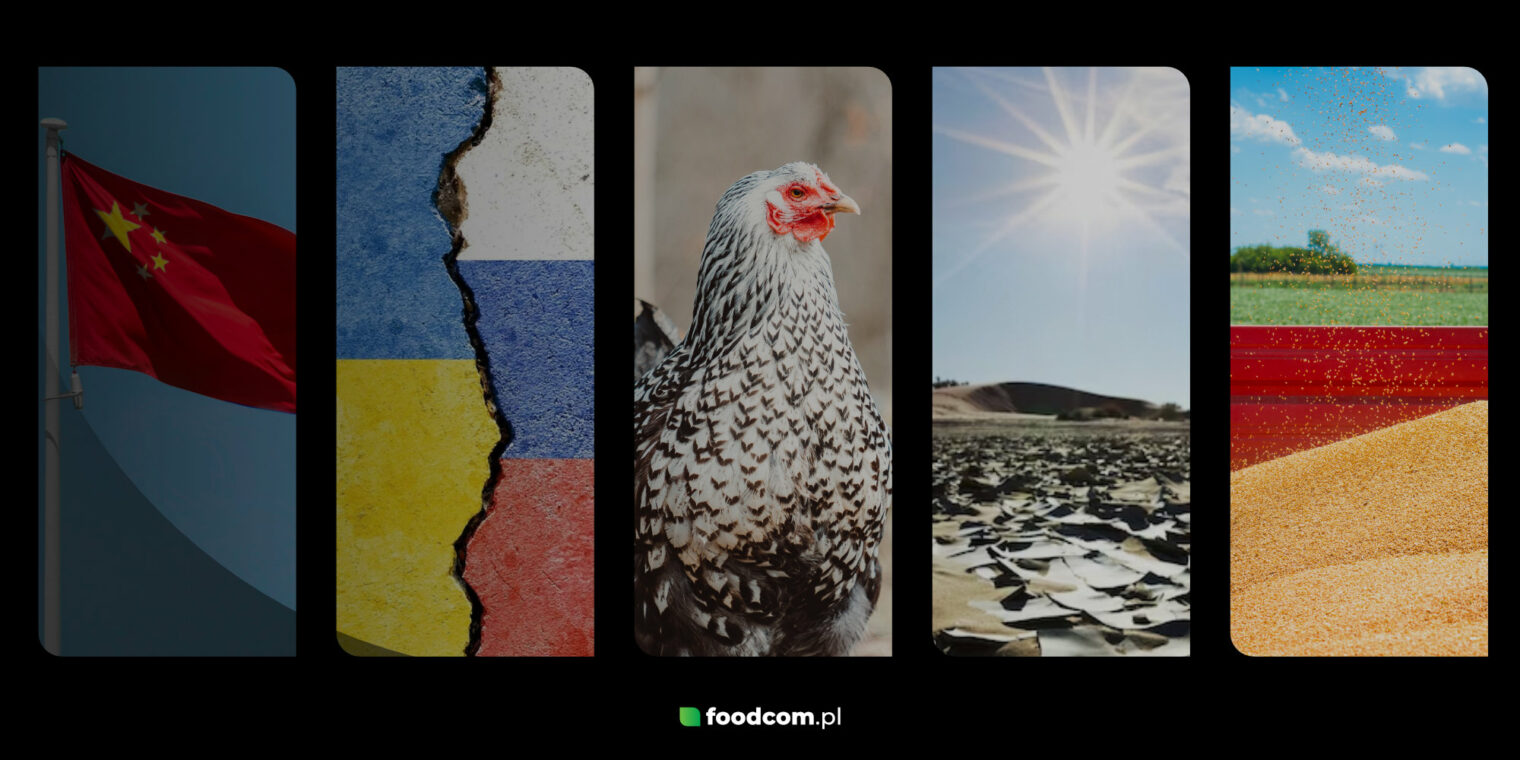Summary
Table of contents
- The biggest impact on the world of trade was certainly the reopening of China.
- Russia’s war with Ukraine continues to cause changes in product prices.
- Avian flu and African swine fever have impacted rising egg prices and lower demand for feed.
- A prolonged drought in Argentina is leading to a significant reduction in expected crop volumes.
- Mexico’s new decree calls into question its demand for corn imports, which is opposed by the USA.
The trade industry is one of the most rapidly changing sectors of the economy. A number of recent events have affected the dynamics of these changes. It is worth keeping up to date. In this article, we present a summary of the top five news stories from the trade industry. Be sure to read on!
In 2020, the world stood still, and it all started in China. The first coronavirus infections were reported there, triggering a global lockdown. Although most countries had been functioning relatively normally for some time, China remained on lockdown. Finally, after nearly three years, China reopened its borders, which had a major impact on global trade. One could say that the reopening of the borders is the biggest economic event of the year.
For companies, both smaller and larger, the ability to sell goods again in the huge Chinese market is of great importance and affects macroeconomic conditions around the world. China’s reopening reduces the risk of sudden disruptions in global supply chains and helps to moderately strengthen global demand.
On the positive side, rising consumption may boost export demand in other countries. However, the flip side is that China’s increased industrial production leads to increased demand for fuels, which could trigger another energy price shock.
The market situation is constantly influenced by Russia’s war with Ukraine. This is significant in that Russia and Ukraine have been major suppliers of food globally, and Russia is also a major exporter of fertilizer. However, after the Russian invasion last February, Ukraine’s access to Black Sea ports was blocked by the invaders’ warships. In turn, Western countries have imposed sanctions on Russia for invading Ukraine.
Amid fears of a worsening global food crisis, an agreement has been reached to allow the safe export of Ukrainian grain across the Black Sea. The so-called grain corridor, an agreement between Russia and Ukraine that was signed with Turkey, has allowed Ukraine to export more than 20 million tons of grain and other foodstuffs since July. But each time the agreement was to be extended, Russia attached conditions to it. In exchange for its agreement, it demanded that its own exports be released, although food and fertilizer exports from Russia are not subject to sanctions. However, an agreement was signed in which UN pledged to support Russian food and fertilizer exports. At that time, authorities in Moscow continued to claim that restrictions on payments, logistics, and insurance were hindering shipments.
All developments related to changes in the Grain Deal have implications for the market situation. The difficult talks in the fall on the continuation of the grain deal drove up quotations on the agricultural market. Even when Russia temporarily withdrew from the deal, wheat and corn prices rose significantly on world trade markets. Maintaining the grain corridor naturally mitigates the rise in commodity prices.
Avian flu has recently proven to be a major problem for farmers. According to experts, wild birds are primarily responsible for spreading the virus. The epidemic of Avian flu began as early as 2022, but now we can definitely already talk about a pandemic – it has spread around the world, and the situation is becoming more serious.
It is worst on the American continent. This pandemic started almost a year ago in the USA, but unfortunately there is no end in sight. The US state of Colorado, for example, has lost more than 90% of its chickens, and this can only mean one thing – an increase in egg prices. The product became twice as expensive, it even became a luxury item, but that did not stop consumers – eggs disappeared from store shelves. The situation does not look rosy in Peru either. There, not only birds such as pelicans, gulls and penguins are dying, but also sea lions. In addition, cases of Avian flu have occurred in humans. However, there is no evidence of human-to-human transmission of the virus, so for now there is no concern about another human pandemic.
The declining poultry population is not the only problem – pigs are also contracting African swine fever. The decline in livestock is impacting lower demand for feed grains.
Argentina is experiencing the worst drought in more than 60 years, leading to a significant drop in expected yields and frequent and drastic cuts in crop forecasts. This is a major challenge for global trade, as the South American country is one of the world’s leading producers and exporters of grains, particularly key commodities such as soybeans, corn and wheat. Wheat production in 2023 is estimated to be half that of the 2021-22 season.
These are not the only weather anomalies in the world – Australia, New Zealand and Southeast Asia have experienced record flooding, and Canada and the United States have experienced snowy and cold winters. Although Australia is on track for a record wheat harvest, any more rainfall could affect crop quality. Experts link all of these weather events mainly to one atmospheric and oceanic phenomenon – La Niña. This is a weather anomaly that occurs quite cyclically, but this time it has lasted a very long time – 3 years, while it usually lasts 9 to 12 months.
Crops, especially corn, were not the best in 2022, which puts even more pressure on 2023 yields. Although it is likely that La Niña will slowly end, this does not mean the end of the problems. According to forecasts, another weather anomaly – El Niño – is expected in mid-2023. This means that Australia will experience an oppressive drought with the risk of bushfires. In South America, meanwhile, instead of cool, dry weather, residents will face persistent monsoon rains. How this will affect the harvest – we will soon find out.
Mexico has planned to phase out the use of genetically modified corn by January 31, 2024. This calls into question Mexico’s need to import corn, which is met with opposition from the United States. About 90 percent of the corn grown in the United States has just been genetically modified.
U.S. officials criticize Mexico’s plans as unscientific and warn that any restrictions on genetically modified corn could lead to an overall trade dispute within the USMCA. Some industry experts worry that Mexico’s restriction on GM corn could prompt other countries to adopt a similar approach, which would in turn disrupt global corn trade. They argue that if biotechnology is restricted, corn production will decline and food costs will rise.
The situation is dynamic-Mexico, under U.S. pressure, has amended its decree to remove the deadline for banning the use of genetically modified corn for industrial purposes and as animal feed, which accounts for a significant portion of U.S. corn imports.
Officials in the U.S. have asked for consultations. This is the first step in a process that could lead the United States to file a formal complaint against Mexico. Canada is also concerned about Mexico’s non-compliance with the USMCA trade pact.
This is not the only problem facing the USMCA pact countries. Longstanding tensions between trading partners over Canada’s protected dairy industry are still being felt. The U.S. wants to settle trade disputes over Canada’s milk quotas and accuses Canada of failing to live up to its commitments to open the market to U.S. producers.
The situation on the trading market is currently very dynamic, with many factors influencing prices. So how can you find your way through all this? The answer is simple: if you want to stay up to date, subscribe to the Foodcom S.A. newsletter, which will provide you with valuable tips and market analysis on commodities and the global situation. This will help you stay up to date on trends and make smart business decisions. Sign up today and never miss important information again!
China is back in the game
In 2020, the world stood still, and it all started in China. The first coronavirus infections were reported there, triggering a global lockdown. Although most countries had been functioning relatively normally for some time, China remained on lockdown. Finally, after nearly three years, China reopened its borders, which had a major impact on global trade. One could say that the reopening of the borders is the biggest economic event of the year.
For companies, both smaller and larger, the ability to sell goods again in the huge Chinese market is of great importance and affects macroeconomic conditions around the world. China’s reopening reduces the risk of sudden disruptions in global supply chains and helps to moderately strengthen global demand.
On the positive side, rising consumption may boost export demand in other countries. However, the flip side is that China’s increased industrial production leads to increased demand for fuels, which could trigger another energy price shock.
Food as a weapon
The market situation is constantly influenced by Russia’s war with Ukraine. This is significant in that Russia and Ukraine have been major suppliers of food globally, and Russia is also a major exporter of fertilizer. However, after the Russian invasion last February, Ukraine’s access to Black Sea ports was blocked by the invaders’ warships. In turn, Western countries have imposed sanctions on Russia for invading Ukraine.
Amid fears of a worsening global food crisis, an agreement has been reached to allow the safe export of Ukrainian grain across the Black Sea. The so-called grain corridor, an agreement between Russia and Ukraine that was signed with Turkey, has allowed Ukraine to export more than 20 million tons of grain and other foodstuffs since July. But each time the agreement was to be extended, Russia attached conditions to it. In exchange for its agreement, it demanded that its own exports be released, although food and fertilizer exports from Russia are not subject to sanctions. However, an agreement was signed in which UN pledged to support Russian food and fertilizer exports. At that time, authorities in Moscow continued to claim that restrictions on payments, logistics, and insurance were hindering shipments.
All developments related to changes in the Grain Deal have implications for the market situation. The difficult talks in the fall on the continuation of the grain deal drove up quotations on the agricultural market. Even when Russia temporarily withdrew from the deal, wheat and corn prices rose significantly on world trade markets. Maintaining the grain corridor naturally mitigates the rise in commodity prices.
(Not only) Avian flu
Avian flu has recently proven to be a major problem for farmers. According to experts, wild birds are primarily responsible for spreading the virus. The epidemic of Avian flu began as early as 2022, but now we can definitely already talk about a pandemic – it has spread around the world, and the situation is becoming more serious.
It is worst on the American continent. This pandemic started almost a year ago in the USA, but unfortunately there is no end in sight. The US state of Colorado, for example, has lost more than 90% of its chickens, and this can only mean one thing – an increase in egg prices. The product became twice as expensive, it even became a luxury item, but that did not stop consumers – eggs disappeared from store shelves. The situation does not look rosy in Peru either. There, not only birds such as pelicans, gulls and penguins are dying, but also sea lions. In addition, cases of Avian flu have occurred in humans. However, there is no evidence of human-to-human transmission of the virus, so for now there is no concern about another human pandemic.
The declining poultry population is not the only problem – pigs are also contracting African swine fever. The decline in livestock is impacting lower demand for feed grains.
Worst situation in Argentina for 60 years
Argentina is experiencing the worst drought in more than 60 years, leading to a significant drop in expected yields and frequent and drastic cuts in crop forecasts. This is a major challenge for global trade, as the South American country is one of the world’s leading producers and exporters of grains, particularly key commodities such as soybeans, corn and wheat. Wheat production in 2023 is estimated to be half that of the 2021-22 season.
These are not the only weather anomalies in the world – Australia, New Zealand and Southeast Asia have experienced record flooding, and Canada and the United States have experienced snowy and cold winters. Although Australia is on track for a record wheat harvest, any more rainfall could affect crop quality. Experts link all of these weather events mainly to one atmospheric and oceanic phenomenon – La Niña. This is a weather anomaly that occurs quite cyclically, but this time it has lasted a very long time – 3 years, while it usually lasts 9 to 12 months.
Crops, especially corn, were not the best in 2022, which puts even more pressure on 2023 yields. Although it is likely that La Niña will slowly end, this does not mean the end of the problems. According to forecasts, another weather anomaly – El Niño – is expected in mid-2023. This means that Australia will experience an oppressive drought with the risk of bushfires. In South America, meanwhile, instead of cool, dry weather, residents will face persistent monsoon rains. How this will affect the harvest – we will soon find out.
What’s next for the USMCA?
Mexico has planned to phase out the use of genetically modified corn by January 31, 2024. This calls into question Mexico’s need to import corn, which is met with opposition from the United States. About 90 percent of the corn grown in the United States has just been genetically modified.
U.S. officials criticize Mexico’s plans as unscientific and warn that any restrictions on genetically modified corn could lead to an overall trade dispute within the USMCA. Some industry experts worry that Mexico’s restriction on GM corn could prompt other countries to adopt a similar approach, which would in turn disrupt global corn trade. They argue that if biotechnology is restricted, corn production will decline and food costs will rise.
The situation is dynamic-Mexico, under U.S. pressure, has amended its decree to remove the deadline for banning the use of genetically modified corn for industrial purposes and as animal feed, which accounts for a significant portion of U.S. corn imports.
Officials in the U.S. have asked for consultations. This is the first step in a process that could lead the United States to file a formal complaint against Mexico. Canada is also concerned about Mexico’s non-compliance with the USMCA trade pact.
This is not the only problem facing the USMCA pact countries. Longstanding tensions between trading partners over Canada’s protected dairy industry are still being felt. The U.S. wants to settle trade disputes over Canada’s milk quotas and accuses Canada of failing to live up to its commitments to open the market to U.S. producers.
Want to learn more? Sign up for the Foodcom S.A. newsletter!
The situation on the trading market is currently very dynamic, with many factors influencing prices. So how can you find your way through all this? The answer is simple: if you want to stay up to date, subscribe to the Foodcom S.A. newsletter, which will provide you with valuable tips and market analysis on commodities and the global situation. This will help you stay up to date on trends and make smart business decisions. Sign up today and never miss important information again!
Categories:







